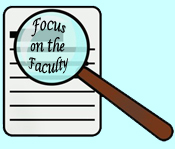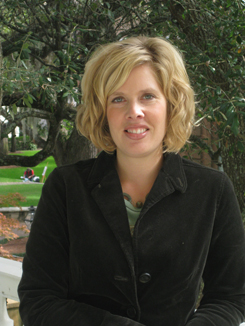Department of Communication


***Update! Feb. 2010: Prof. Moscowitz is the recipient of a prestigious research and teaching grant. See this link. ***
Trending social issues in the media are regularly detected on the radar of communication professor Dr. Leigh Moscowitz. She has studied many issues covered by the media, such as gay marriage and portrayals of class and gender in entertainment.
Some of her research has been recognized by the academic world with national awards.
Moscowitz's main interest of study is how controversial issues are covered by the media. "I believe news coverage to some extent shapes how we as a culture view particular issues, events and communities," she says.
In 2003, while beginning her dissertation, Massachusetts became the first state to legalize gay marriage. "It seemed like overnight, the gay marriage issue replaced abortion as the central social issue in the 2004 presidential election campaign," Moscowitz recalls. "Gay marriage stories led local and national television newscasts, and became front page news in the major papers and news magazines."
To learn more about this issue, Moscowitz traveled to New York, San Francisco, Boston, and Washington D.C. to interview gay rights activists. She is contemplating return to interview those same activists next year to see what has changed.
"Clearly, we've seen a lot of movement state-by-state to legalize gay marriage, and increased public support," she says. "But at the same time there is vehement resistance on the part of voters to grant same-sex marriage rights to gay and lesbian couples. So the issue is complex and paradoxical. I think gay marriage is one of the most definitive issues of our time, because it is about much more than homosexuals bid for marriage rights. It is about how we define the institution of marriage in our modern time, and whom we allow 'in' and whom we cast 'out' of this institution."
Moscowitz's research expands beyond the gay marriage debate. "I am more generally interested in how various racial, class, and gender identities are covered in mainstream media and popular culture- what some call the politics of media representation," she says.
Other research topics she has addressed have been coverage of child abductions after September 11, 2001 and how class and gender are represented in the series "Real Housewives"specifically the New York season.
Dr. Michael Lee, another communication professor at College of Charleston also studied these representations alongside Moscowitz. "Working collaboratively with Dr. Moscowitz was very rewarding. She is an excellent researcher and a thoughtful writer," Lee says.
Moscowitz's research has earned her many awards. As a graduate student at Indiana University, she won several grants that allowed her to conduct research for her dissertation. Earlier this semester, she received the 2009 Nafziger-White- Salwen Award for having the top dissertation in her field by the Association for Education in Journalism and Mass Communication.An article about her achievement can be found at https://journalism.indiana.edu/news/moscowitz-dissertation-earns-top-aejmc-award.
In 2009 Mosocwitz was honored with an award for outstanding teaching by CofC undergraduates in the Department of Communication.
Junior Katie Willis says of Moscowitz's Mass Media class: "The class really opened my eyes to the drastic transformation of media through the years. Dr. Moscowitz breaks the material up in to five debates in order to really focus on specific forms of media as they exist together."
Moscowitz's fellow colleagues also recognize her ability to reach her students. Communication Professor Dr. Celeste Lacroix says, "Dr. Moscowitz is a highly dedicated and student-oriented teacher, who brings great enthusiasm to her classes. She has designed interesting courses, which are rigorous but student-friendly. She is innovative and makes herself accessible to students -- for instance, in her 'Pop with the Prof' hours she makes time just to get to know her students better. She is the kind of professor that students respect and enjoy, and I would recommend any communication student- actually, any student at the College- take a course with her!"
She received her B.A., M.A. and Ph.D. from Indiana University, in journalism and mass communication. She is very proud of her Hoosier State alma mater, calling it "one of the best journalism programs in the country."
She saw a job opportunity here at the College of Charleston, came for an interview, and fell in love with the campus. Moscowitz says the College of Charleston has an "amazing campus with bright and engaged students and great faculty colleagues. I have been able to add new courses to the curriculum and teach in our graduate program. Those are excellent opportunities for only being in my second year. It allows me to fulfill the teacher-scholar model. Your teaching energizes your research program and your research drives your teaching."
Before settling in Charleston, Moscowitz lived in Bloomington, Ind., Peoria, Ill. and the San Francisco Bay Area, where she worked in public relations and marketing before attending graduate school.
On top of conducting research and teaching, Moscowitz has two young children with husband, Dr. David Moscowitz, who is also a CofC communication professor.
"I like to say I have a very 'full' life, never a dull moment," she said. "Much work in our household gets done between the hours of 9-to-midnight after an already long day, not always ideal. In terms of my research, I need that balance between teaching and writing- they use different parts of you. As I said earlier, I think my role as a researcher makes me better in the classroom, and vise versa."
There is no doubt that Moscowitz will continue to have success with her research and success as an engaging and caring teacher. As for what her research will entail next, she says it may involve gay people who oppose gay marriage.
"There is a whole arm of the gay movement- this is what you don't hear as much about in the popular press- that thinks that marriage equality is perhaps not the most important thing the movement should be fighting for. So there are many, many other issues that face the gay community that go beyond marriage equality: employment non-discrimination, access to health care, AIDS research and funding, equal housing, etc. The list goes on and on. Marriage equality may solve some of these issues but not completely, and only for those couples who marry. It still leaves many, arguably most, of the community out of the cold," Moscowitz says.
###